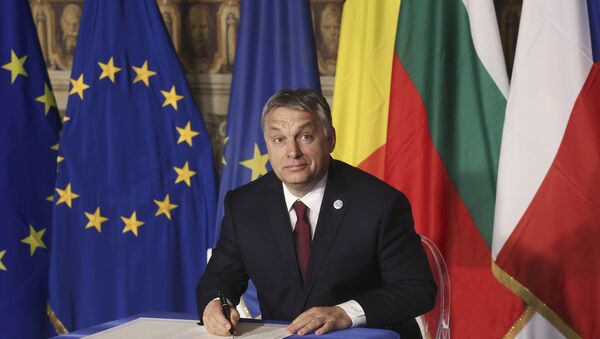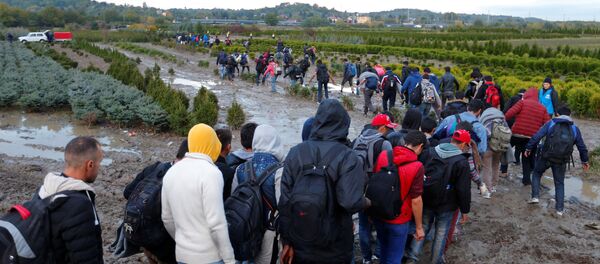"Orban's supporters, who live primarily in small towns and villages, do not really care what the EU thinks about him, quite the opposite — it's pleasant for them!" political analyst and Director of the Institute of Sociology at Corvinus University of Budapest Tamás Pál told Sputnik.
Tamás Pál: People usually think the following: he's the leader of a small country, but he can stand up for the national interests in the European arena. Proud Hungarians are flattered by this. And although I am Orban's political opponent I acknowledge his talent as a politician, his ability to communicate with people, feel the society's needs and the mood of the ordinary man in the street and use this knowledge to increase his own popularity. All of Orban's anti-immigrant policy is based on that.
READ MORE: After Election Win, Hungary's Ruling Party Might Soon Get Rid of Soros for Good
What is more, he is not only a Eurosceptic, he opposes the international capital and the UN policy on refugees. Actually, all his rhetoric usually targets the domestic population and is not transformed into real actions. On the surface it seems that Hungarians are choosing an anti-Western, anti-European leader. But he obediently pursues EU policy, to quarrel with them would means loosing huge subsidies.
Sputnik: What changes in the life of Hungarians have taken place during Orban's tenure? Or is that also confined to rhetoric?
Tamás Pál: It must be recognized that the country's economy is continuing to improve, GDP increased 4%, and not at the expense of oil and gas prices. This is higher than the EU average, although neighboring countries such as the Czech Republic, the Slovak Republic and Romania are growing faster.
People feel stability.
What's interesting, the country has an authoritarian government and it is for that Orban has been criticized by Brussels. Many Hungarians don't like it, but the desire to have stable and quiet life outweighs all the disadvantages of limiting freedom in people's minds. Again the unemployment rate in Hungary is one of the lowest in Europe and is around 6%. Even the Roma are being hired in the country, which is very rare in Europe.
What is the cause of such growth in the Hungarian economy?
Tamás Pál: Of course, it is to a great extent due to European subsidies and the fact that there are large modern manufacturers in the country owned by international corporations and they are working at full capacity. The automobile concern Daimler has put into operation a new Mercedes — Benz assembly plant. There is also the Audi plant here in Hungary, which not only produces cars but also assembles almost all of the Audi engines, about two million pieces a year. The largest car engine assembly plant in all of Europe is in Hungary. So we generate profits not from canned cucumbers and Globus green peas. Many of our enterprises are internationally-oriented and their personnel are closely related to the EU economy. In fact, Orban's victory is not accidental, he essentially won with votes from rural areas, and in big cities, in Budapest for example, where the electorate is mostly pro-Western, he lost.
READ MORE: Soros-Funded NGO 'Has Been Controversial in Israel for Long Time' — Ex-MP
In fact, Viktor Orban has received very strong support from the people. Will it be used somehow to change Hungarian policy within the EU?
Tamás Pál: No, nothing will be changed. The European Union will continue to endure statements by the Hungarian head of state because Brussels needs him for solidary voting on, for example, the imposition of sanctions on offending countries. As a matter of interest, Poland and Hungary agreed to mutually protect each other within the EU. For instance, Article 7 of the Lisbon Treaty envisages the implementation of internal sanctions against an EU country for breach of European citizens' fundamental rights by suspending its right to vote in the EU Council. Such charges have been already framed against Poland. Hungary stated that it would not vote for it, arguing that the decision should be taken unanimously. But when it comes to pivotal pan-European issues Hungary is absolutely loyal to the EU and NATO.
The views of Tamás Pál are those of the speaker and do not necessarily reflect those of Sputnik.




